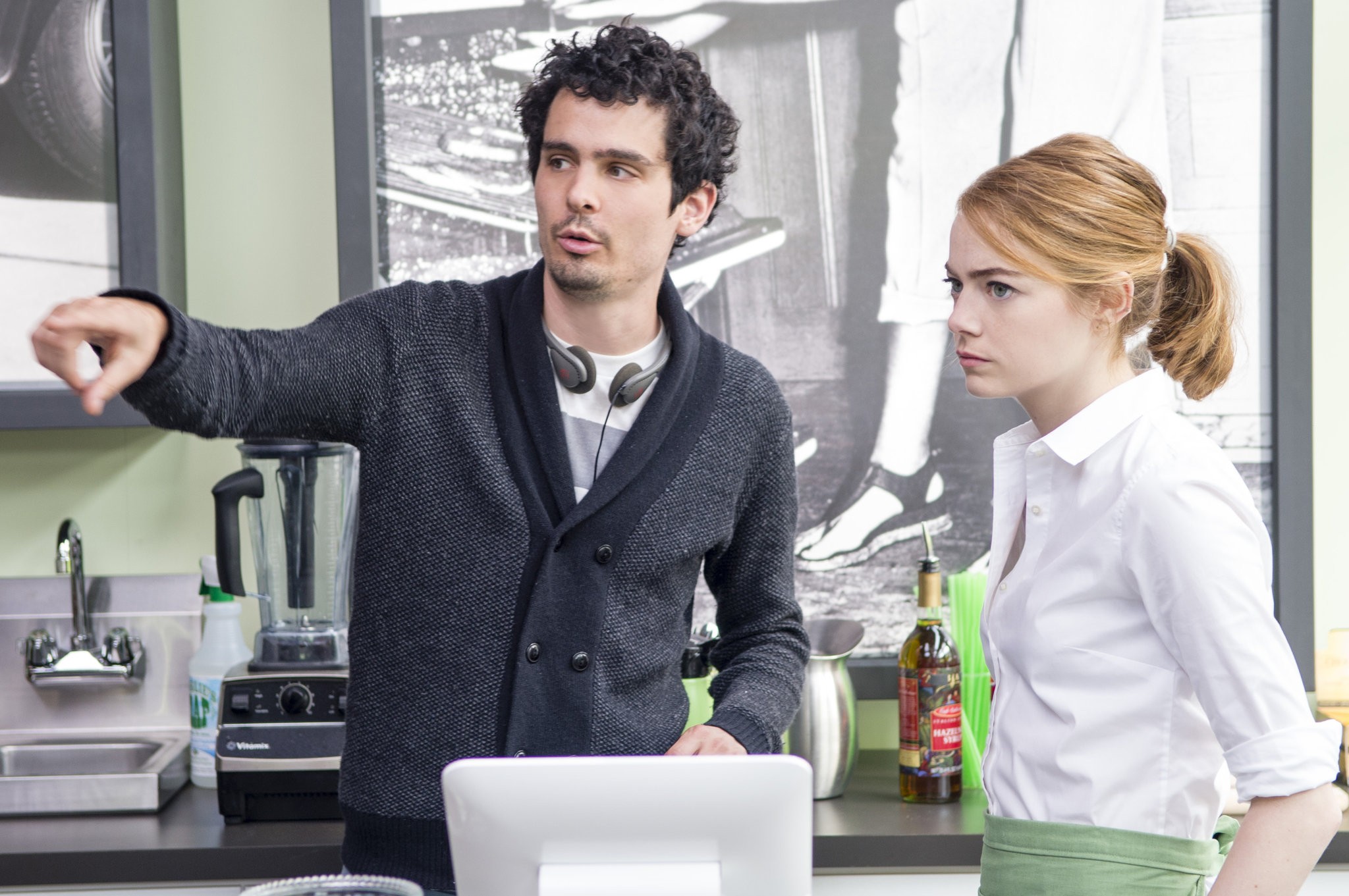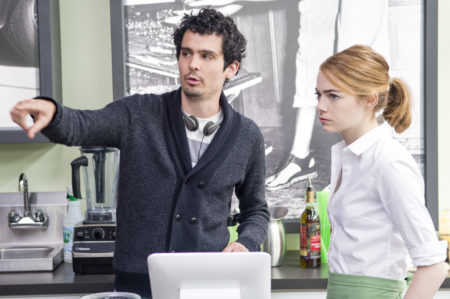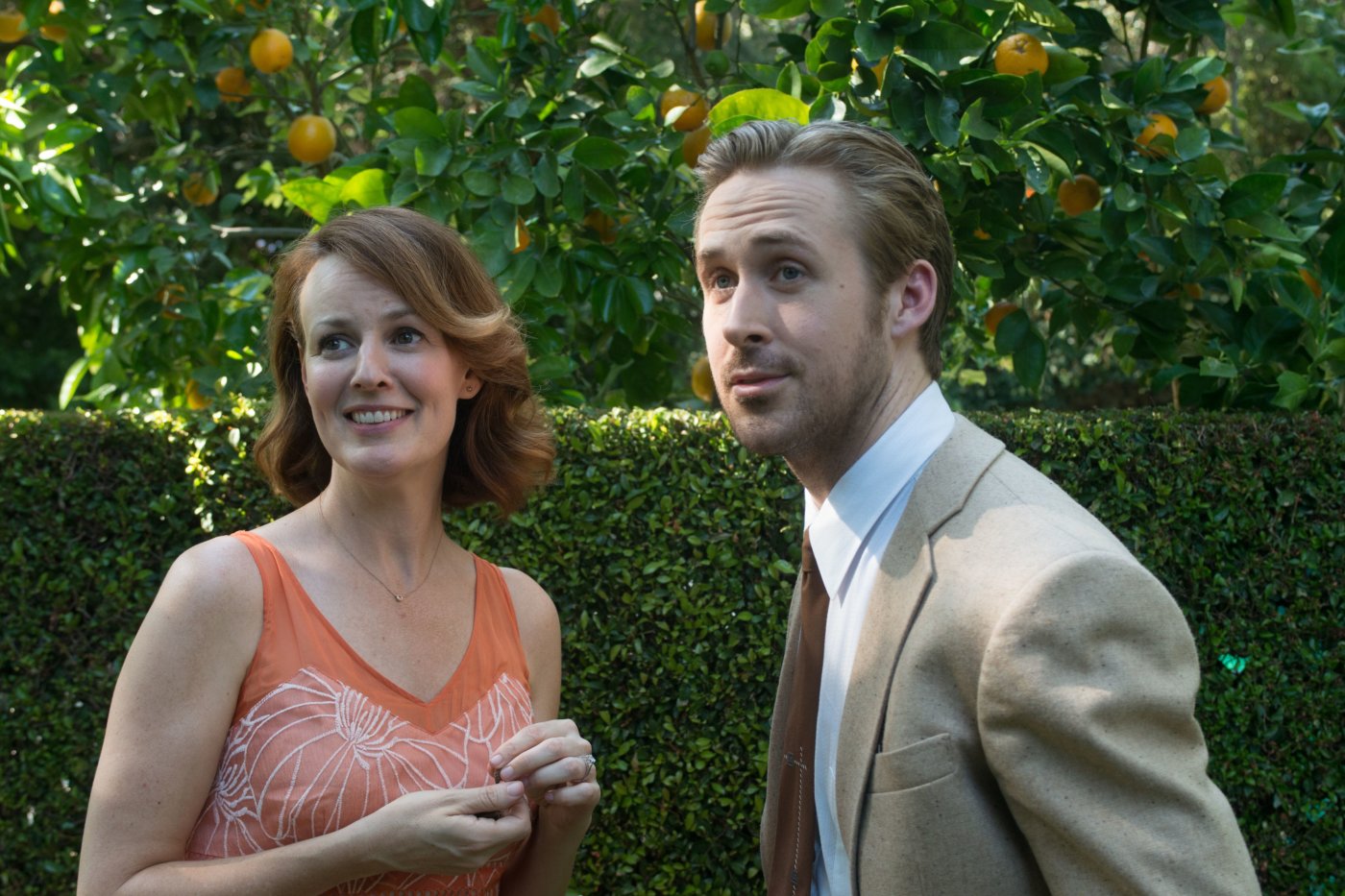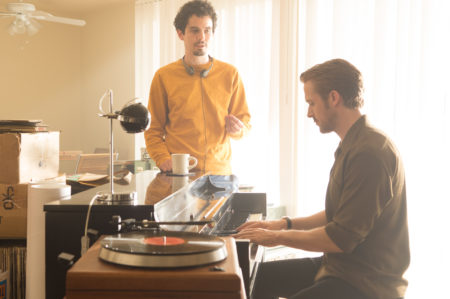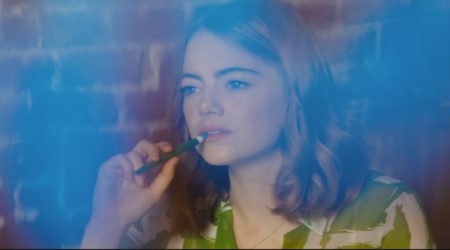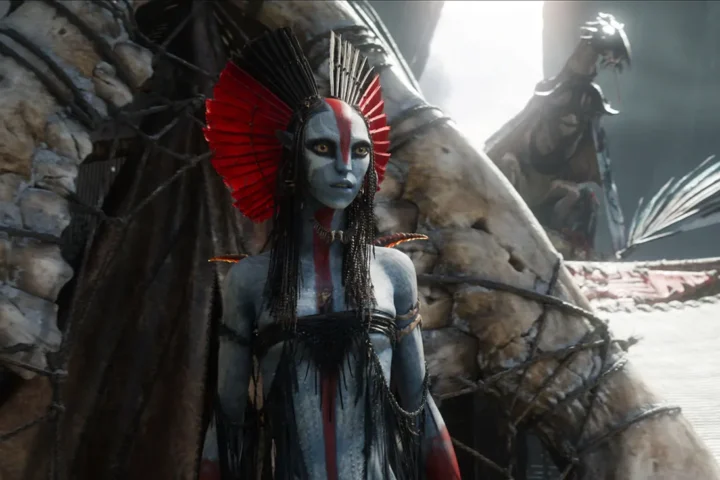In a bravura act of movie invention, filmmaker Damien Chazelle has fashioned a throwback that’s also contemporary; a musical that is intensely dramatic; a love story of élan and heartbreak; and one of the best-ever movie love letters to starry-eyed, pure of heart struggling artists who learn about the courage—and sacrifices—needed to make it to the top. Perfectly embodied by Emma Stone and Ryan Gosling as the dreamiest of movie star paramours courting each other and Los Angeles, the magic that is La La Land sits a the top of not just 2016’s very best movies, but also its most moving.
31-year-old Chazelle, who previously directed Whiplash, the story of a wunderkind teen drummer and his unorthodox instructor (an Oscar win for JK Simmons), knows a thing or two about striving for excellence in craft, and it shows in this remarkable new movie, a gorgeously rendered evocation of what it takes to achieve your dreams, as swoony and romantic as Whiplash was visceral, though largely about the same passion to prove yourself when you know you’ve got the goods.
Actress Rosemarie Dewitt is part of Chazelle’s La La Land ensemble as the practical sister of Ryan Gosling’s struggling jazz pianist. Dewitt, an always dependable, workmanlike actress has paved her own way to acclaim in a series of notable indie turns in pictures like Rachel Getting Married, for which she narrowly missed an Oscar nod, The Company Men and Your Sister’s Sister. A focused, sharp performer with psychological acuity in every role, Dewitt has her feet on the ground in La La Land while Gosling and Stone (literally) take flight.
I recently caught up with certain Oscar-nominee Chazelle and Dewitt to talk about their bittersweet new movie, one that owes as much a debt to Jacque Demy’s 1964 French heartbreaker The Umbrellas of Cherbourg as it does to Singin’ in the Rain. You can have it all, their movie says, just perhaps not all at the same time.
Our freewheeling discussion took some decidedly personal turns about the aspirations and sometimes neuroses of choosing an artist’s path, including unavoidable comparative analyses with your contemporaries and the struggle to stay on the path of what you love—and who you are.
Rosemarie Dewit: Ask your best question—your most burning one—now, because we tend to talk…a lot.
Damien Chazelle: Rosemarie, especially, just loves to listen to herself talk. She goes on and on and on and on.
RD: Well I love to talk about my character. I really think it’s all about Laura.
DC: Yes, let’s do the one thing that you haven’t done yet, once.
RD: Talk about my character?
DC: Yes, talk about your character.
It’s like Rashomon.
DC: It is!
Damien, you clearly love the musicals of Jacques Demy and Michel Legrand.
DC: Unabashedly. I can’t recall whether I saw Lola or The Umbrellas of Cherbourg first. But anyway, one of those was first and I was blown away. And then I became more immersed in his work, but it was the basic idea that they are such humanist movies and ones that are about people. Every person has their reasons in a Demy movie. There are no villains. Things never quite work out, but you would not call them tragedies. They are bittersweet, like life. But they are also incredibly cinematic and magical. Even a non-musical like Lola feels incredibly epic and fairy tale-like. So there is a fairy tale aspect to regular life which Demy always found, and that is something that I really love.
I think that was at the outset of what I was hoping to do here; combine real life with the musical and do something along the lines of these old MGM musicals or Jacques Demy musicals, but try to ground them in the reality of everyday stuff today. And then cast it with people like Rosemarie and Ryan Gosling and Emma Stone, and actors who, to me, don’t feel like musical theater actors—not that there is anything wrong with that—but people whom you would not expect, and who would bring a different dimension to it and an accessibility and modernity, so that it didn’t float off into the air.
Rosemarie, last night you said that someone in the audience might cry at the end of the film…
RD: Yes, and I think Damien got mad at me! It was like a spoiler. He said ‘Don’t set me up to fail!’
DC: She was!
I think what you are talking about is that in the Demy films and this one, there are big and earnest emotions.
DC: Yes.
Not diffused through irony.
DC: Right, there is no irony.
It’s really refreshing. Much of this is in Emma Stone’s performance.
RD: She’s so transparent, like there is nothing between her and us. It is true of both Emma and Ryan and their chemistry is super important. For some reason, there is something about her journey that I feel like we are so right there with her. (To Chazelle) Did you know that in the way you were shooting the film? Like how tight was the audition scene? Is it a tight shot?
DC: Her number? Well it goes from head to toe and then tight.
RD: And then back out?
DC: Yes, back out. The thing that I had seen Emma do before that I wanted to embrace in this movie was the charm and humor and playfulness and sassiness. What I knew we needed in this movie, and which I hadn’t seen from Emma before, was a raw vulnerability at certain points you feel like you are seeing completely right into the soul. There are no wisecracks to separate you from that.
I could name two such moments—after the one-woman-show and later when Ryan asks her to return to Los Angeles.
DC: Yes. And I knew I wanted that kind of feeling from her, whereas with Ryan it was a different. You want them to embody what they each do. Sebastian is a character who pours his emotions into music and through a piano. Mia is an actress who by necessity of craft displays her emotions out, through no sort of prism. So with Ryan it was really interesting as a counterpoint working on what he does. On set it was so magical for me to watch this sublimating of emotion, especially in the back half of the movie where he is starting to compromise and you feel the inner defeat within and sense that he is losing himself, and then finding it again a bit towards the end. All of this happens through the smallest of expressions.
His moment of stillness onstage.
DC: Exactly. Just a single moment. A single still moment in which he is able to express so much. That is part of why they have good chemistry together, and what was fun about working with them on this movie was that sort of counterpoint and balance. Both characters going through big emotional journeys but expressing those in different ways. In many ways it’s how they were written as well. Sebastian, like a lot of musicians I know, was someone who sublimates his emotions, whereas Mia wears them on her sleeve.
RD: They are also such great movie stars and actors that they don’t need to do ‘extra.’ For example, in that last sequence, when you do push in on them in club, they are not doing more that they need to. so They are feeling everything they are feeling, and we can feel with them. Sometimes actors will do this sort of—and audiences marvel at it— ‘This is how heavy this barbell is and I’m pushing it over my head,’ and it’s like ‘Give them an Oscar! That was so hard to do.’ But sometimes actors live it, and it’s so small and subtle and truthful that we are so moved, like I was about this film. I was delighted and heartbroken and so many things that are not always felt. A lot of times I feel manipulated by a film and this one I don’t. I feel like I am being entrusted with a very fragile gift. There are big songs and big emotions, but it is very delicate and it is mine.
No, it’s mine.
RD: It’s yours! But that’s how you feel! It is my movie that I love!
The movie embraces the courage it takes to be an artist, and to fall in love as well. There are ambitions and sacrifices that go with the territory. To be an artist you have to go out there and put yourself at the edge and then maybe it still won’t happen. Same thing with love.
RD: Jumping kind of to the middle of that question, I remember early on in my early 20s being sort of devastated about the stereotypes that follow an artistic path, ‘I’ll probably never get married. Probably will also never have a kid. I am going to have to be crazy and alcoholic.’
‘Driven by demons.’
RD: Yes! If you want to be good at something, that there is kind of only one way to go about it. Or, ‘I’m not crazy enough to do it.’ And there is this weird wrestling within you. And you want it because you know there is something about it that you love so much that you are willing to forgo a lot of conventional- you definitely cannot keep up with people. It’s like when you are 30, and people have jobs on Wall Street and are buying houses. You have to be like, ‘I’m still a bartender.’ Not to get too poetic and corny about it, but it really is a path. You cannot even copy other actors that you like because it never works. You are like, ‘Oh, by that age Julia Roberts had already done Pretty Woman. I’ll never make it.’ You do all this stupid stuff and then you just realize that, ‘Oh, okay, I love it. And hopefully I’ll get to have a life from my artistry and my relationships.’ And in this film you see how hard it is to love two things that much.
As an actor, you cannot play two actions at the same time. You have to play one and then the next. You can love your partner and then you can love your jazz music, but you cannot do it at the same time. And in that struggle, beautiful things happen, but also sacrifices. And timing gets lost and things fall by the wayside. It is like pushing something huge and precious through the birth canal! Most careers don’t get going- Damien is a little bit of an anomaly. (To Chazelle) Not that you have not had your struggle, but you are really young to be doing this level of work at this stage. Usually nobody knows your name for the first 15 years.
DC: For me, it was the same kind bullshit and you have to fight against it, but the same constant caparisons. I really shouldn’t be saying this, but I used to have charts of any filmmaker I idolized, from Eisenstein until now, and the ages they were at each juncture of their careers. How old was Eisenstein when he made Strike? How old Leos Carax was when he made Bad Blood? Spielberg when he made Jaws? And those were all really depressing markers because they are all fucking supermen. But then occasionally you would have other people who got going later, like maybe Michael Mann…
RD: Georgia O’Keefe.
DC: Yeah, well I related to filmmakers (laughter), but I should have done a complete map of every artist of every discipline I guess. But it still hard to get out of that mindset that you have to be following ‘this’ path and if you are not on track…
RD: But this feels like your own path, doesn’t it?
DC: Well, to you maybe, but to me I feel like I may never get out of the self-comparison vortex or maelstrom. But it is not that you want to- you want to get out of the shallow aspect of ‘so and so was this age,’ but you always need to have these dreams that you are chasing and idols motivating you to do better or do something as good as X or Y. That I thrive on, for sure. As a movie lover and student of film history I thrive on it, and that I would not want to lose. So it is a balance between trying to be competitive and chasing, but also true to yourself.
Rosemarie, onscreen you have a particular brand of what I would call emotional acuity. You are very precise, and I have seen that in The Company Men, Rachel Getting Married, Your Sister’s Sister and also in Digging for Fire. You really convey intensity.
RD: Oh, thanks.
LS: You don’t think so?
RD: I just can’t take a compliment. (laughs)
What was the worst audition you’ve ever had?
RD: Oh! I probably have had so many. Hopefully you can’t find it on the internet, but…
DC: Now we can go look for it and find it!
RD: …I remember being in a classroom auditioning for a student film and somebody giving me this horrendous ‘assault improv’ where something terrible happened to me, and I was flailing around on the classroom floor crying! It was for some movie I think I ended up making which never got finished but there is probably footage somewhere. But you kind of love it so much that you don’t actually have the appropriate boundaries and you are not, in a way, taking care of yourself. You are just going out there and trying to give everybody what they want from you. That may not be my worst audition story, but it’s my audition psyche.
And this is a totally name-droppy story, but it’s one of my favorite ones. I did Your Sister’s Sister with Emily Blunt and she told me a story about doing that super cool movie she did with Joseph Gordon-Levitt and Bruce Willis. Do you know that one?
Yeah, Looper.
RD: Looper! She told me she was doing chemistry reads with the little boys who might be playing her son, and the director said to the one who eventually got the job, ‘Emily would be playing your mom and she either dies, or you are afraid she is going to die. And I want you to really cry and go there and do that. Can you do it?’ And this little boy said, ‘Well, I can if you give me the job.’ (laughter) And I thought, my God. He is a genius. Because there is this time when we do these things we are not ready to do before we are ready to do them, just because we want to live this dream that is in this film.
